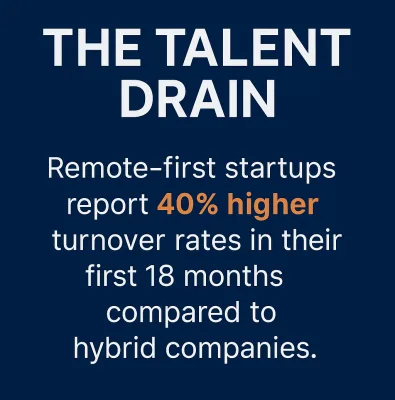The Startup Dilemma for Founders in Europe and Beyond
It starts with a Slack message: “We should meet in person sometime.” Then again. And again. That weekly sync can really use a whiteboard. Client meetings feel flat on Zoom. And suddenly… you’re wondering:
Is it time we had a space of our own?
For Pieter, a Brussels-based founder of a 14-person SaaS startup, the question came just after a new hire failed to show up for their second week. No warning, no message. Just gone. “Honestly, I think it’s because they never felt connected to the team,” Pieter shared. “We onboarded them in Slack. They met no one in person. The whole company was a Google Doc to them.”
You may not need an office today. Although were you reading this, you’re likely feeling the tension between staying lean and building something more real. That tipping point deserves exploration.
What You’re Really Weighing: Not Just Cost
We often frame this question in terms of budget. But it’s bigger than that. It’s about culture, cohesion, and credibility.
Staying Fully Remote |
Going Hybrid |
|---|---|
| Lower fixed costs | Professional brand presence |
| Max hiring flexibility | Faster onboarding & bonding |
| Great for deep focus | Better real-time collaboration |
| Harder to build team culture | Stronger team identity |
| May feel isolating | Shared sense of momentum |
Stat to consider: 68% of European startup employees say they’d feel more loyal to a company that invests in a hybrid workspace, even when it’s used just a few times a week. (Source: EU Startup Monitor, 2025)
Pieter puts it simply: “We didn’t need a headquarters. We just needed a place that felt like a home base.”
 The Hidden Costs of Staying Fully Remote
The Hidden Costs of Staying Fully Remote
Before diving into office costs, consider what you might already be losing:
The Talent Drain Remote-first startups report 40% higher turnover rates in their first 18 months compared to hybrid companies. For a growing team, losing even one key person can cost €15,000-30,000 in recruitment and onboarding.
The Client Credibility Gap “We were pitching to a major enterprise client,” Pieter recalls, “and halfway through the Zoom call, you could see them losing interest. Later, they told us they went with a competitor who had ‘a more established presence.'”
The Innovation Slowdown Those spontaneous conversations that spark breakthrough ideas? They’re rare in Slack. Research shows that hybrid teams report 23% faster problem-solving compared to fully remote teams.
The Numbers: Is It Really That Expensive?
Let’s crunch a few Brussels-based numbers. Say your team of 10 currently uses coffee shops or occasional day passes.
Monthly Workspace Cost Comparison (Brussels)
| Option | Approx. Monthly Cost (EUR) |
|---|---|
| 10 x coworking day passes | €1,200 |
| Private office (10 desks) | €3,500–4,200 |
| Hybrid plan (3 days/week) | €1,500–2,000 |
Here’s the thing: hybrid office costs can be partially offset via regional support.
Funding & Tax Support in Brussels
- Brussels-Capital subsidies: ~€5,000 per new job created in office-based roles
- Horizon Europe grants: Up to €2.5M for scaling tech teams
- Hybrid workspace fit-out: 100% deductible as capital expense in Belgium
With tools like Desklog or Toggl, you can even measure in-office productivity versus remote outcomes to justify the spend.
“We ran a 90-day test with a hybrid setup. Productivity actually rose 23%. But what really changed was team morale.” — Beatrice M., Founder
Signs You Might Be Ready
Still unsure? Ask yourself:
- Are remote meetings becoming less productive or creative?
- Do new hires feel disconnected?
- Are client impressions starting to matter more?
- Are you booking more meeting spaces than ever before?
- Do you spend more time organizing work than doing it?
- Has anyone on your team mentioned missing “real” collaboration?
Did you answer yes to two or more, it’s worth experimenting with a private or hybrid office space.
The Psychological Leap: From Startup to Company
This isn’t just about desks and meeting rooms. It’s about making your business feel like a business—to your team, your clients, and maybe even to yourself.
For Your Team “During one of our weekly retrospectives,” Pieter remembers, “Sarah—one of our senior developers—said something that stuck: ‘I love the flexibility of remote work, but I miss having a place that feels like ours.‘”
That sense of belonging translates into retention, creativity, and culture. Teams with a shared physical space report:
- 35% better cross-team collaboration
- 28% faster onboarding of new hires
- 42% stronger company culture ratings
For Your Clients Professional space signals stability and growth. It’s the difference between “we’re a startup working from home” and “we’re a growing company with a real presence.”
“Running a remote team has its complexities, but Workways has made our lives so much easier. Their tech setup is spot-on, and having flexible workspace options means our team can collaborate effectively whether they’re in Paris or working remotely.”
— Jean-Luc D. / Remote Team Manager, Paris
Where to Start (Without Going All In)
The beauty of today’s hybrid solutions is that you don’t need to make a massive commitment upfront.
Try Before You Commit
- Start with one day per week hybrid plans
- Test different configurations (all-team days vs. smaller group sessions)
- Measure productivity and team satisfaction
Make It Culture-First
- Use the space for team days, brainstorming sessions, and client meetings
- Don’t just recreate remote work in an office setting
- Focus on activities that are genuinely better in person
Share the Investment
- Invite partners, mentors, or even clients to use the space
- Host industry meetups or workshops
- Turn your office into a networking hub
Apply for Support Early Brussels Academy offers workshops on Horizon EU access and hybrid workspace tax breaks. The application process can take 2-3 months, so start early.
Making the Hybrid Model Work
Success isn’t just about finding space—it’s about being intentional with how you use it.
The Two-Day Rule Many successful hybrid teams find that 2-3 days per week is the sweet spot. Enough to build culture and collaboration, not so much that you lose the flexibility that makes remote work attractive.
Designate Purpose
- Monday: Team alignment and planning
- Wednesday: Client meetings and external collaborations
- Friday: Retrospectives and team building
Measure What Matters Use tools like Desklog or Toggl to track productivity across remote and office days. Many founders are surprised to find that office days drive different types of value—not necessarily more hours worked, but more strategic work accomplished.
A Final Thought
The question “Is it time for our first hybrid office?” isn’t really about timing—it’s about readiness. Are you ready to invest in your team’s connection? Are you ready to signal to clients that you’re serious about growth? Are you ready to give your startup a physical foundation for its next phase?
Having a hybrid office doesn’t mean giving up the flexibility that makes remote work attractive. It’s about being intentional with your presence. You’re not giving up freedom—you’re giving form to it.
Where you work shapes how you work. Maybe it’s time to give your team a place that reflects the business you’re becoming, not just where you started.
You don’t need to go big. You just need to go smart.
Where you work shapes how you work. Maybe it’s time to give your team a place that reflects the business you’re becoming — not just where you started. Considering speaking to one of the Workways team about hybrid office solution for your growing team? Explore flexible workspace solutions that grow with your startup at workways.com.
💬 Frequently Asked Questions
A hybrid office blends physical workspace with remote flexibility. For startups, it means having a professional space available a few days a week — perfect for collaboration, onboarding, and client meetings — without committing to a full-time lease.
Even just 1–2 shared days a week can help build trust, spark spontaneous collaboration, and create a sense of belonging — something that’s hard to replicate in purely remote environments.
Yes. Cities like Brussels and Paris offer startup-friendly grants, tax deductions for hybrid office fit-outs, and even funding tied to job creation. These can offset setup costs and reduce long-term overhead.



 Fr
Fr